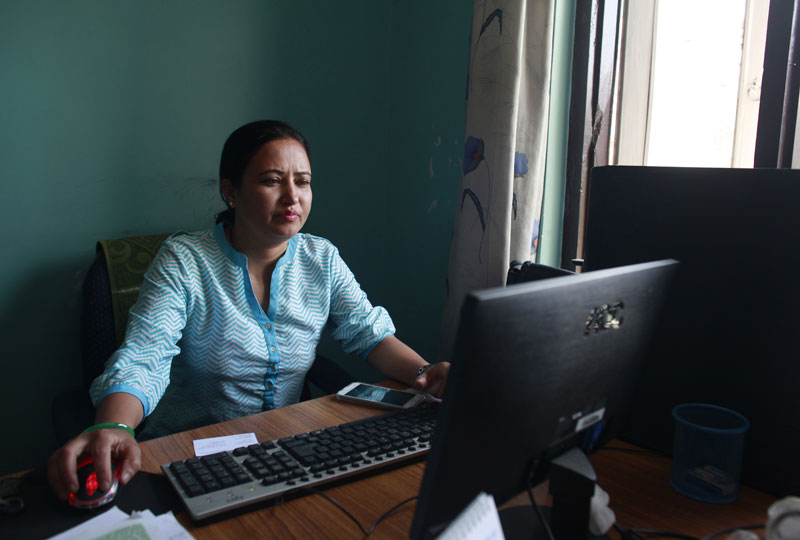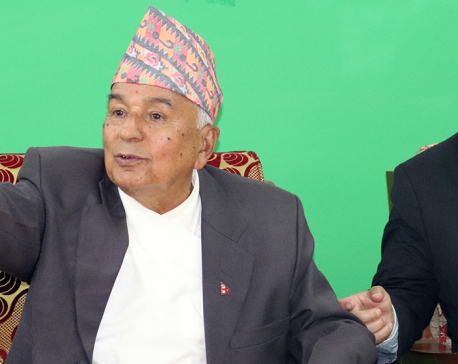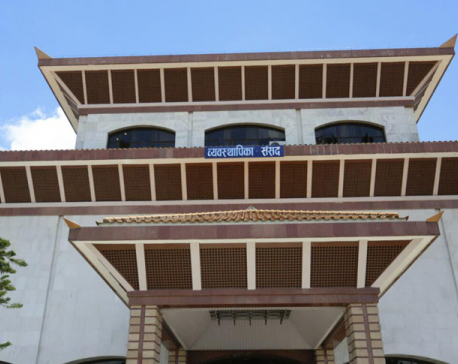
OR
Survivors of insurgency fear crimes will go unpunished
Published On: August 30, 2016 02:36 PM NPT By: Associated Press

KATHMANDU, Nepal, Aug 30: The image of the teacher's body tied to a tree and riddled with bullets still haunts his son 14 years later. Communist militants allegedly dragged the Nepalese man from the class he was teaching and then killed him for refusing to give part of his salary to fund their bloody rebellion.
Suman Adhikari has little hope he will get justice for his father's death — not with the same Maoist fighters-turned-politicians controlling the Himalayan country's government.
Despite international pressure and government promises, including by the Communist Party of Nepal (Maoist Center) themselves, Adhikari and thousands of other conflict victims are still waiting for information about loved ones who were among the 17,000 killed or hundreds who disappeared during the decade-long insurgency demanding an end to the country's now-defunct monarchy.
"The Maoists want everyone to forgive and forget whatever happened during the conflict, but that is not acceptable to us," said 40-year-old Adhikari, who works for a Kathmandu-based charity that works with the deaf.
Earlier this month, Maoist leader Pushpa Kamal Dahal became Nepal's prime minister, leading the poor and politically fractious country's ninth coalition government in 10 years. His ascent to the top elected position completed the Maoist's political rehabilitation started in 2006 when they signed a U.N.-brokered peace accord to end their guerrilla campaign against authorities.
Meanwhile, Nepal is still beset by ethnic conflict and protests against its new constitution, and coping from widespread damage caused by earthquakes that killed thousands last year.
For victims of the old insurgency, the Maoists' rise was nothing to celebrate. Those hoping for resolution from a newly assembled Truth and Reconciliation Committee fear the Maoists will seek to sweep away post-conflict cases by delaying investigations, ignoring advice to prosecute or even legislating for a general amnesty that would absolve all crimes.
With the committee's mandate expiring in February next year, some of its 100 staff members admit they have neither the time nor the manpower to investigate the more than 53,000 complaints alleging human rights violations unless the government extends its mission. None of the cases have been resolved so far.
"In the time we have left, I don't think we will be able to deal with even a fraction of the number of cases we have in our hands," commissioner Madhavi Bhatta told The Associated Press. They also have asked the government to revise the rules for investigating, for example, to include torture as a listed crime and to extend the six-month statute of limitations on rape so that decades-old assault allegations can be considered. The committee can only recommend prosecution for government lawyers to pursue; it cannot take such action on its own.
The Maoists have pledged they will not seek amnesty and would help bring justice for "victims of crimes outside of war rules," according to spokeswoman Pampha Bhusal.
"We will not suppress these cases but will resolve them," she said. "We are going to resolve all these issues on the basis of international norms and human rights and the peace agreement we signed."
Victims and rights groups expressed doubt about the Maoists' sincerity.
In one of their recent pushes for a general amnesty, the Maoists in May forced then-Prime Minister Khadga Prasad Oli to sign an agreement saying the government would "immediately initiate the process to withdraw or give clemency on insurgency-era cases and other politically-motivated cases filed on various occasions"
And former Maoist parliament member Bal Krishna Dhugel was convicted in 2010 of a 1998 murder, but Maoist pressure and a pending clemency request have ensured he remains free despite a Supreme Court order this year not to grant him amnesty.
Analysts said the Maoists would have trouble pushing for a blanket amnesty. They do not have the necessary parliamentary majority to vote such an amnesty into law, and even the suggestion could upset their coalition partners and undermine the stability of their government.
"What they (Maoists) have been saying in the past, that they will go for blanket amnesty, is not possible this time," said Deepak Prakash Bhatt, internal security professor at Tribhuwan University in Kathmandu. "There are checks and balances. Because they are not heading the defense ministry, home ministry and foreign ministry, it is not possible."
But delaying the investigations could leave them unfinished, rights activists said.
"The whole process has been prolonged so much that the proof and evidence we have is getting lost or disappearing," said Sudip Pathak of Nepal's National Human Rights Commission. "I don't believe the victims will get justice any time soon."
Analysts and rights groups have pressed the government to speed up reconciliation efforts or risk becoming even more unpopular in Nepal, where many people express frustration with widespread corruption and regret losing the monarchy.
Amnesty International and Human Rights Watch together warned Nepal not to bargain away justice while negotiating coalition government politics.
Nepal should "take immediate and effective steps to safeguard victims' rights to truth, justice and reparation through a credible transitional justice process that is free of any political interference or any forms of pressure or intimidation," the groups said in a joint statement issued in May.
To victims and their families, the prospect of resolving past crimes and healing old wounds looks bleak.
"We want to know why they were killed; they were unarmed and not part of the fighting," said Anita Jnawali, who said her father was a local politician in the western village of Kerunga when he was hacked to death inside his home for refusing to join the Maoists in their fight.
"We have almost lost hope," the 33-year-old drinking water consultant said. "The Maoists are always trying to suppress our cases, and now that they are in the government we are even more suspicious that they will bring new laws and make attempts to provide amnesty to their people."
You May Like This

Quake victims tell president they are yet to get relief
SURKHET, Nov 7: Earthquake survivors in Jajarkot have appealed to President Ram Chandra Paudel for medical treatment, food, and shelter... Read More...

Lawmakers demand immediate distribution of grant to quake survivors
KATHMANDU, July 30: Lawmakers have demanded no more delay in distribution of grants to earthquake survivors for house re-construction. ... Read More...

Lawmakers demand to provide grant amount of Rs 150,000 to quake survivors
KATHMANDU, July 3: Lawmakers speaking at today's Legislature-Parliament meeting drew the attention of the government to distribute a lump sum... Read More...










Just In
- NRB introduces cautiously flexible measures to address ongoing slowdown in various economic sectors
- Forced Covid-19 cremations: is it too late for redemption?
- NRB to provide collateral-free loans to foreign employment seekers
- NEB to publish Grade 12 results next week
- Body handover begins; Relatives remain dissatisfied with insurance, compensation amount
- NC defers its plan to join Koshi govt
- NRB to review microfinance loan interest rate
- 134 dead in floods and landslides since onset of monsoon this year








Leave A Comment